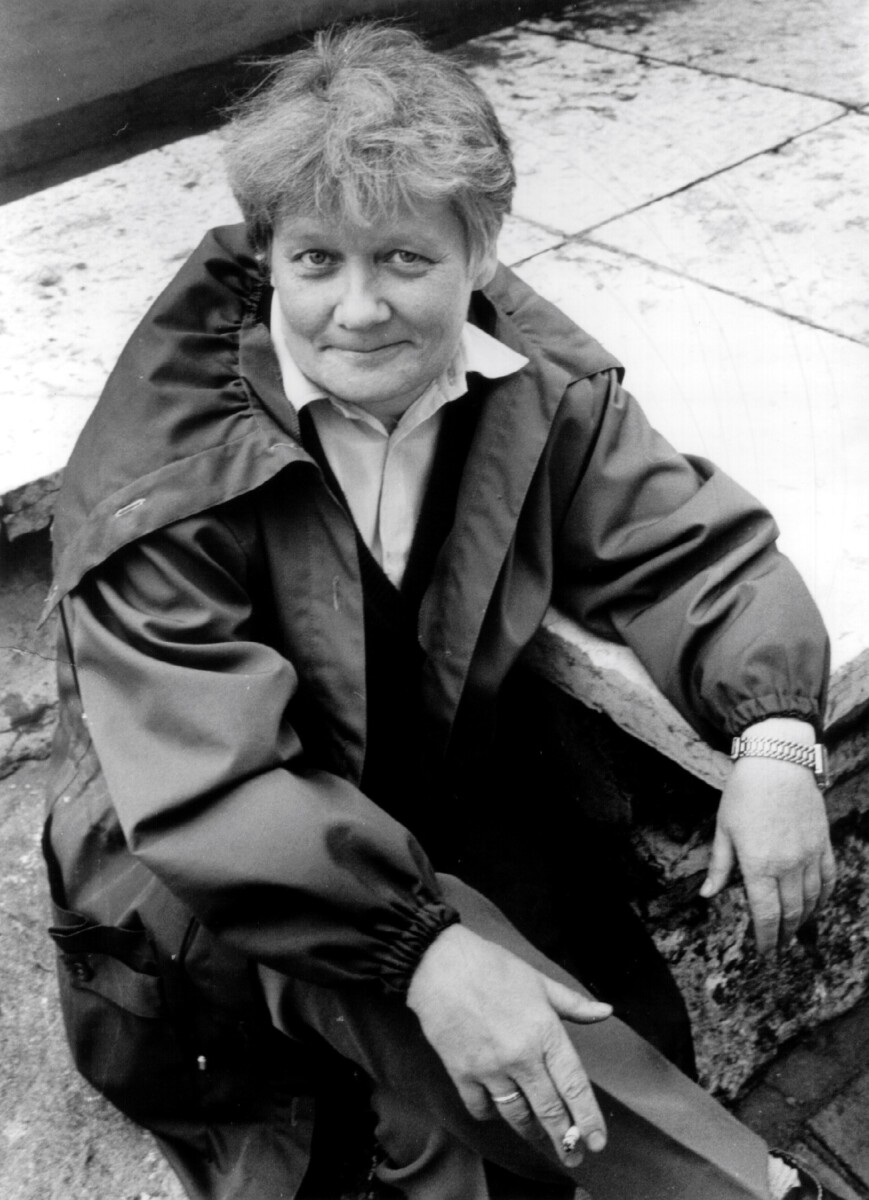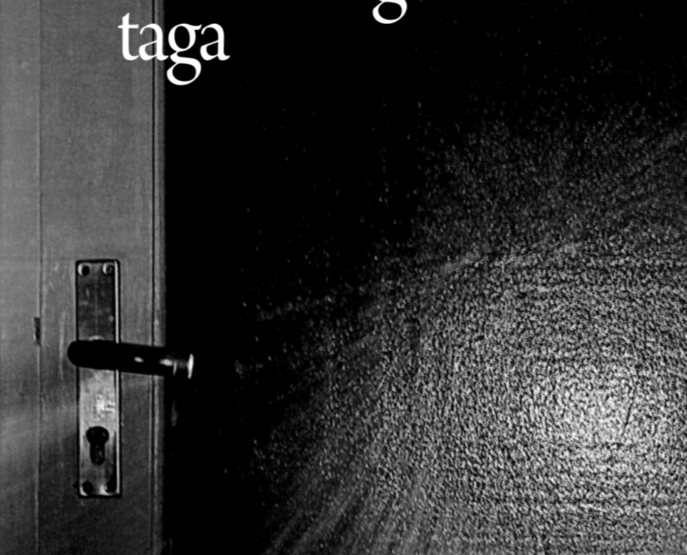The tragic Estonian poet, Juhan Liiv, who lived on the knife-edge between genius and insanity, lived at the turn of the 19th and 20th centuries and went into history as a prophet, foretelling the coming of the Estonian state in his works. The Estonians’ belief in poetry and the power of words originates partly with him: the word that has been uttered by a poet, a thing that has once been given a name, has been destined to become the reality. The Juhan Liiv Poetry Prize, established about thirty years ago, is unique among Estonian literary prizes. It honours the word and is not a monetary prize, but the winner is awarded a shepherd’s bag made of leather, or some other leather artefact; it is presented to the author of the most outstanding poem published in any given year, the chairman of the awarding committee being the winner of the previous year’s prize.
In 1999, Ene Mihkelson was awarded this prize for the second time, and this was not a chance occurrence. The selection was made bythe committee, chaired by the Grand Old Man of Estonian poetry, Kalju Lepik, who passed away on May 30th, that same year. The decision of the committee conveys acknowledgement for the work, in the best traditions of Estonian poetry: a master recognizing another master as equal.
Ene Mihkelson (born 1944) studied Estonian literature at university, worked for a short time as a teacher, then as a researcher at the Estonian Literary Museum, but for the greater part of her life she has been a free-lance writer in Tartu. Although she published her first work as early as 1967, her first collection of poetry “Selle talve laused” (The Sentences of This Winter) could not appear until 1978. Being the child of a Forest Brother, she was not approved by the Soviet powers-that-be; the subject of fighting for freedom, which fills her work, later gave reason for the analysis of tragic events in Estonian history.
By now, her voice has been heard in Estonian poetry for a quarter of a century, and she has published ten collections of poetry; two of them – “Võimalus õunast loobuda” (A Chance to Refuse the Apple) (1990) and “Hüüdja hääl” (A Calling Voice) (1993) – being recognized as the best books of those particular years. Her latest collection of poetry to date, “Pidevus neelab üht nuga” (Continuity Swallows a Knife) was published in 1997, and a large volume of her selected poetry will appear in 2000. Mihkelson’s poems have been translated into German, most recently in a representative selection of Estonian poetry Die Freiheit der Kartoffelkeime (Cologne, 1999). Apart from poetry, Mihkelson has published four novels, a collection of short stories “Surma sünnipäev” (The Birthday of Death), and a selection of critical essays entitled “Kirjanduse seletusi” (Explanations of Literature). From among her novels the polyphonic “Nime vaev” (The Torment of the Name) (1994) was best received. This book dug hauntingly deep into the key strata of historical problems at the dawn of the new independence.
With regard to form, Mihkelson’s poetry is far from traditional: her poems cannot be divided into verses or stanzas, they lack metre, phonological instrumentation and rhythm. Potential pauses are only marked by capital letters, accentuating the beginnings of sentences, and by enjambements, breaking lines and interrupting the text at rather unexpected places. Characteristic of Mihkelson’s poetry is its intense, concise and strained language, unexpected inversions and paradox. On the one hand, her poems are unified and complete, on the other, they are fragmentary and resemble fragments torn from some magical-realist saga, the hazy beginning of which drawing its subject-matter from the collective mythological past. Then her poetry moves to her childhood, spent in a Forest Brethren bunker, in a collective prison of the 1950s, and finally, it reaches the present by depicting the pains of the rebirth of society, and by the uncompromising manifestation of freedom. Mihkelson’s words are full of pain, she says that “Writing is a wound on the white body of paper that is torn by touches”, and a sentence written by Hermann Hesse that she quotes in one of her poems, showing the sufferings of people who live on the border of two epochs as a real hell, could well be the motto of the whole of her poetry. The style of her poetry is allegorical, it discusses metaphysical subjects and rises above its own epoch. Earlier, it has been said that Mihkelson’s poetry is difficult to understand, but this accusation mostly originated with the Soviet tendency at levelling. Factors shaping the fate of a small nation, relations between people, history, and the world are, indeed, intricately and paradoxically mixed in her work, but I always recall some verses from her first collection “Selle talve laused”: “I have been asked, whether I can make it more complicated, and I have told people that I cannot make it more complicated as it already is, ditto making it easier.” This sounds like a maxim, written in another poem: “If to write poetry at all, then only in an impossible way”.
Such is the credo of the poet Mihkelson: writing poetry always means seeking one’s own truth instead of being content with everyday truths, it is an adventure of language in search of an ever more exact expression of this truth. Through intertextual relationships, Mihkelson’s poetry relates intensely to our past, and our earlier poetic tradition, with our present, (but does not become ephemeral), and also with our future. Never leaving the national plane, her poetry has evolved towards greater universality, it has developed with global time, stepping into the new millennium, and with the Estonian time, counting the tenth anniversary of the new independence. This poetry points out the chance of being totally modern in a superb way, of being contemporary, a phenomenon which can also be seen in the prize poem. The soul bird in the poem, who loses its feathers one by one, is directly related with the fate of Juhan Liiv and the motif of the wounded bird which can be found in Liiv’s poetry, but also reaches further out towards global culture: from the beginning, birds have been depicted in Christian art as the symbols of “winged souls”, in the mythology of ancient Egypt birds symbolized the spiritual, as opposed to the material.
The main aim of Mihkelson’s poetry is to give names to things. Memory and naming are her dominating motifs. Mihkelson names things and phenomena, as only things possessing names are ableto persist. As regards the past, naming denotes saving something essential from oblivion, and as regards the present, it is an invitation for something essential to come into being. Mihkelson firmly believes that all things come into being when they are born in language, she believes that the Word creates time. She herself thus becomes the creator of poetry and time.



